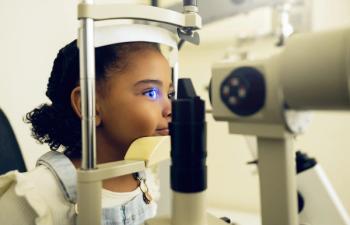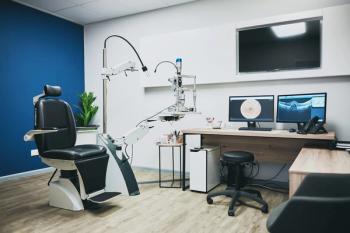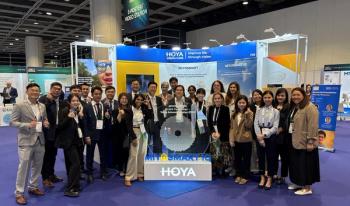
- Vol. 10 No. 9
- Volume 10
- Issue 9
Q&A: Laura Chonko, OD. Nutrition and eye care, dark organic chocolate, and walking across hot coals
Where did you grow up?
I grew up in North Olmsted, OH, in the Cleveland area on the west side. My parents still live in North Olmsted. My dad worked at Ford Motor Company for 36 years, and my mom is a piano teacher with a degree in music education.
How open are your patients to nutrition information?
My patients are very open, most of them. As optometrists, we are seeing more and more diabetic patients, so I find that if we are not talking about nutrition, we are leaving out part of the equation. Eyes don’t exists in a separate space-they are connected to the body, so we need to talk about the whole body. We ask about patients’ blood sugar levels and A1Cs but I find it important to find out about their diet. Sometimes you have to get specific and ask, “What did you have for lunch today?” You get a better feel for what they are eating, or they’ll say, “Well…” and then they will tell you the real story.
I had a patient who was diabetic, and we were talking about her food and drink; she told me she had eight Pepsis a day. I said, “You realize that if you didn’t drink eight Pepsis a day, you might not be diabetic.” She said, “Yes, but that’s my joy. Don’t take that away from me.” So, I think we need to move the discussion to where else can you find joy in your life. That was eye opening but sad to hear a story like that.
Did your daughter’s cataract surgery impact you as an OD?
It did. I was already an optometrist. It was ironic when her pediatrician at the hospital on day one came in and said, “I think your daughter may have a cataract.” Once you get over the shock of it, it’s good and bad because she was definitely born to the right mom. I learned a lot. She developed an esotropia, she has had three eye muscle surgeries, and it’s been an interesting journey. But she does great, and she’s about to turn 16.
What’s something your colleagues don’t know about you?
I am an information junkie. [Laughs] I love to read and learn a ton. In the morning when I’m getting ready, I’ll listen to podcasts or something informational.
How did you get interested in ocular nutrition?
It’s been an interesting journey. I became interested well over a decade ago when I read Kevin Trudeau’s Natural Cures They Don’t Want You to Know About. He said some interesting things in that book, and at the time I wasn’t sure if he was crazy or if these things were true. That led me down a path of doing more research. I then got a booklet from the AAO meeting and in it was advertising from the Ocular Nutrition Society, so I went to that meeting. I just started learning and it was fascinating.
A lot of it we didn't learn anything about in school, so I was like a whole new world opened up. I didn’t know what pesticides might be on my vegetables, I never really thought about that before. Of course I was looking at labels, but what is actually in this? If you can’t pronounce things, maybe you shouldn’t be eating that. I became interested and saw the research about the eye and nutrition, in particular ocular diseases.
Why become a certified holistic health coach?
At the time it was something my inner being told me I needed to do. So, I trusted my gut. I did learn a lot, and it wasn’t so much academics and research but more listening to people and their story.
How did your fellowship with the Ocular Nutrition Society happen?
As soon as I heard about a fellowship in nutrition, I was all over that because I already attend nutrition conferences. I applied, it was 150 hours of accredited nutrition education, and you wrote a case report or, in my case, a paper.
How did you develop your practice philosophy?
If you think about what we do, the eye is the window to the body. All of my colleagues can attest that we see thyroid disease showing up in the eye; diabetes, heart disease, pretty much every disease seems to have an ocular manifestation. We might see a symptom in the eye and we are going to treat that symptom, but we need to think about the underlying root cause, what is causing the symptom, and what other conditions might be there.
Yeah, we are not going to treat outside our scopes of practice, but we need to be aware and offer things that could be supportive in specific conditions. We are not treating that condition, but good nutrition can help any condition.
What is something about optometry you want to change?
Reimbursement rates? [Laughs] Normally I pay more to get my hair cut than many of these companies pay me to do an eye exam. If I could change one thing about optometry, I think it would be to expand our scopes of practice.
We can treat anything that’s eye-related, but if we could do coaching or become a certified nutrition specialist-which I think is the intention with [the ONS fellowship] program-because I feel we have to limit ourselves right now to what could truly help patients and they may not be getting that information or help from any other health practitioner. We could help fill in those gaps.
What is your guilty pleasure food?
Chocolate, of course. [Laughs] If it’s dark, organic chocolate, even better. I’d feel less guilty. [Laughs] I’m not perfect, and I’m human like everyone else. I feel that if I get off track that I’ll just keep going further off track. So, I have to try and walk my talk, right? Be the change you want to see in the world. I think you have to start with yourself. If I expect people to do something, it can’t be something that I myself am not willing to do.
Do you have any regrets?
I don’t have any regrets. I’m not going to say, “Oh, I wish I hadn’t done this or that,” but it’s life, it’s learning. I think of one of my favorite movies, It’s a Wonderful Life. If you didn’t do this, that, or the other, then you wouldn’t be in the same place. Yeah, you can’t have any regrets.
What is the craziest thing you’ve ever done?
I was at a Tony Robbins event called “Unleash the Power Within,” and I walked across hot coals. That was pretty intense. You have to see yourself at the other side having successfully done it. You have to use that imagery so you can just do it. Yeah, it was amazing. It was probably about eight feet. [Laughs] It was a few steps, it wasn’t just two.
Articles in this issue
over 7 years ago
Vision care back in Kentucky Medicaid mixover 7 years ago
Why osmolarity should be the top test for tear film evaluationover 7 years ago
3 strategies to grow your practiceover 7 years ago
5 tips to impress contact lens patientsover 7 years ago
View patients as missed opportunity, not lost causeover 7 years ago
OCT helps diagnose retinoschisis in glaucoma patientsover 7 years ago
Dry eye protocol for any practiceover 7 years ago
When to send your hypertensive patient to the ERover 7 years ago
Highlights of ARVO 2018’s anterior segment postersover 7 years ago
Know the four stages of dry eye blepharitis syndromeNewsletter
Want more insights like this? Subscribe to Optometry Times and get clinical pearls and practice tips delivered straight to your inbox.





























